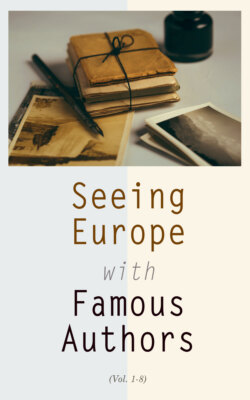Читать книгу Seeing Europe with Famous Authors (Vol. 1-8) - Гарриет Бичер-Стоу - Страница 83
На сайте Литреса книга снята с продажи.
TO THE HEBRIDES1 By James Boswell.
ОглавлениеTable of Contents
My acquaintance, the Reverend Mr. John Macauley, one of the ministers of Inverary, and brother to our good friend at Calder, came to us this morning, and accompanied us to the castle, where I presented Dr. Johnson to the Duke of Argyle. We were shown through the house; and I never shall forget the impression made upon my fancy by some of the ladies' maids tripping about in neat morning dresses. After seeing for a long time little but rusticity, their lively manner, and gay, inviting appearance, pleased me so much, that I thought for the moment, I could have been a knight-errant for them.
We then got into a low one-horse chair, ordered for us by the duke, in which we drove about the place. Dr. Johnson was much struck by the grandeur and elegance of this princely seat. He thought, however, the castle too low, and wished it had been a story higher. He said, "What I admire here, is the total defiance of expense." I had a particular pride in showing him a great number of fine old trees, to compensate for the nakedness which had made such an impression on him on the eastern coast of Scotland.
When we came in, before dinner, we found the duke and some gentlemen in the hall. Dr. Johnson took much notice of the large collection of arms, which are excellently disposed there. I told what he had said to Sir Alexander Macdonald, of his ancestors not suffering their arms to rust. "Well," said the doctor, "but let us be glad we live in times when arms may rust. We can sit to-day at his grace's table without any risk of being attacked, and perhaps sitting down again wounded or maimed." The duke placed Dr. Johnson next himself at the table. I was in fine spirits, and tho sensible that I had the misfortune of not being in favor with the duchess I was not in the least disconcerted, and offered her grace some of the dish that was before me. It must be owned that I was in the right to be quite unconcerned, if I could. I was the Duke of Argyle's guest, and I had no reason to suppose that he adopted the prejudices and resentments of the Duchess of Hamilton. …
The duchess was very attentive to Dr. Johnson. I know not how a middle state came to be mentioned. Her Grace wished to hear him on that point. "Madam," said he, "your own relation, Mr. Archibald Campbell, can tell you better about it than I can. He was a bishop of the Nonjuring communion, and wrote a book upon the subject." He engaged to get it for her grace. He afterward gave a full history of Mr. Archibald Campbell, which I am sorry I do not recollect particularly.
He said Mr. Campbell had been bred a violent Whig, but afterward "kept better company, and became a Tory." He said this with a smile, in pleasant allusion, as I thought, to the opposition between his own political principles and those of the duke's clan. He added that Mr. Campbell, after the revolution, was thrown into jail on account of his tenets; but, on application by letter to the old Lord Townshend, was released; that he always spoke of his lordship with great gratitude, saying, "tho a Whig, he had humanity."
A gentleman in company, after dinner, was desired by the duke to go into another room, for a specimen of curious marble, which his grace wished to show us. He brought a wrong piece, upon which the duke sent him back again. He could not refuse, but, to avoid any appearance of servility, he whistled as he walked out of the room, to show his independence. On my mentioning this afterward to Dr. Johnson, he said, it was a nice trait of character.
Dr. Johnson talked a great deal, and was so entertaining, that Lady Betty Hamilton, after dinner, went and placed her chair close to his, leaned upon the back of it, and listened eagerly. It would have made a fine picture to have drawn the sage and her at this time in their several attitudes. He did not know, all the while, how much he was honored. I told him afterward. I never saw him so gentle and complaisant as this day.
We went to tea. The duke and I walked up and down the drawing room, conversing. The duchess still continued to show the same marked coldness for me; for which, tho I suffered from it, I made every allowance, considering the very warm part I had taken for Douglas, in the cause in which she thought her son deeply interested. Had not her grace discovered some displeasure toward me, I should have suspected her of insensibility or dissimulation. …
He was much pleased with our visit at the castle of Inverary. The Duke of Argyle was exceedingly polite to him, and, upon his complaining of the shelties which he had hitherto ridden being too small for him, his grace told him he should be provided with a good horse to carry him next day.
1 From "A Journal of a Tour to the Hebrides with Samuel Johnson, LL.D."
